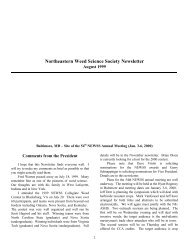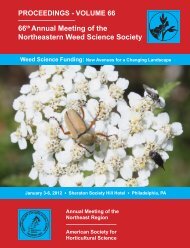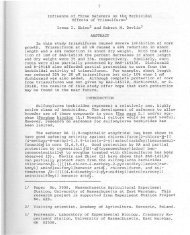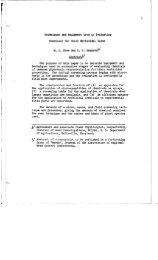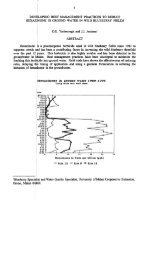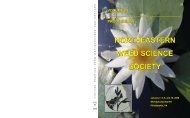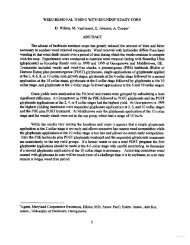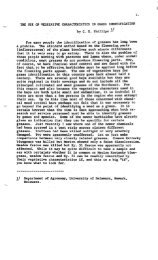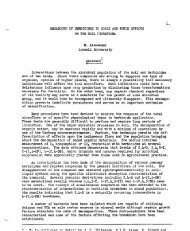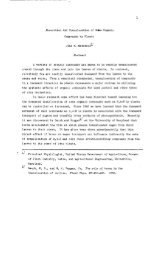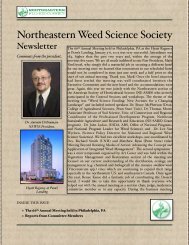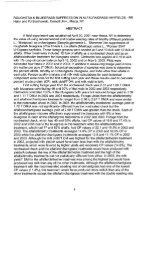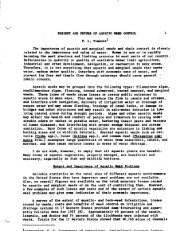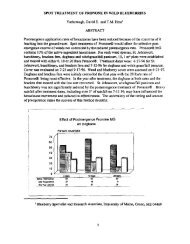Proceedings of the Sixty-first Annual Meeting of the Northeastern ...
Proceedings of the Sixty-first Annual Meeting of the Northeastern ...
Proceedings of the Sixty-first Annual Meeting of the Northeastern ...
Create successful ePaper yourself
Turn your PDF publications into a flip-book with our unique Google optimized e-Paper software.
183<br />
are doing. We need to continue to educate Bowers about <strong>the</strong> significance <strong>of</strong> applied<br />
weed science research. Don Shilling said we should draft a letter to Bowers and get <strong>the</strong><br />
commodity groups on Board. Carol said that Bowers will attend <strong>the</strong> WSSA <strong>Meeting</strong> in<br />
New York and that we need to make sure he attends a number <strong>of</strong> sessions and possibly<br />
meets with <strong>the</strong> Board <strong>of</strong> Directors. Lee said he will continue to meet with Bowers to<br />
discuss weed science research priorities. In terms <strong>of</strong> <strong>the</strong> poor submission rate from<br />
weed biology, Lars said we need to encourage more NRI applications. Lee will send out<br />
a notice <strong>of</strong> <strong>the</strong> NRI program via email during <strong>the</strong> <strong>first</strong> week <strong>of</strong> November. The letter <strong>of</strong><br />
intent for NRI grants is due in early December.<br />
CSREES Workshop on Plant and Pest Biology Priorities- Lee stated that WSSA will<br />
have <strong>the</strong> opportunity to address CSREES about its future research priorities in <strong>the</strong> area<br />
<strong>of</strong> plant and pest biology on Nov. 16 in Alexandria, VA. Carol has since talked to David<br />
Shaw, who agreed to make <strong>the</strong> presentation at <strong>the</strong> workshop. Lee will work with <strong>the</strong><br />
WSSA Research committee over <strong>the</strong> next 10 days to draft a 1 page written summary <strong>of</strong><br />
our priorities that is due by Nov. 9. (Please see <strong>the</strong> Dec. Newsletter story below for<br />
more information). The following link will take you to NRI Competitive Grants Program<br />
Request for Applications (RFA): http://www.csrees.usda.gov/funding/rfas/nri_rfa.html<br />
5. Find opportunities to advance <strong>the</strong> awareness and financial support <strong>of</strong> weed science in <strong>the</strong><br />
2007 Farm Bill.<br />
a. Lee said <strong>the</strong> National Association <strong>of</strong> Wheat Growers (NAWG) is initiating a Weed<br />
Resistance management project through <strong>the</strong> NAWG Foundation that will produce a<br />
web-based curriculum on <strong>the</strong> topic. Primary target audiences include wheat growers<br />
and educators. NAWG needs to recruit a respected weed scientist in each <strong>of</strong> several<br />
geographic/climatic regions to serve as a reviewer. The reviewers would be provided<br />
an honorarium to compensate <strong>the</strong>m for <strong>the</strong>ir time. NAWG will also be looking for a<br />
weed science graduate student affiliated with on <strong>of</strong> <strong>the</strong> universities to serve as a<br />
technical coordinator. Lee talked with Darren Coppock, NAWG Executive Director,<br />
to get more details and proceeded to work with Nathan Danielson from BioCognito,<br />
<strong>the</strong> company being used by NAWG to organize <strong>the</strong> work, to request applications<br />
from interested weed scientists. On Dec. 7, 2005, Biocognito chose Dr. Lynn<br />
Fandrich from Oregon State to head <strong>the</strong> project. A similar weed resistance project is<br />
likely to be conducted for cotton in <strong>the</strong> near future.<br />
b. Lee attended a Co-FARM meeting where Rob Hedberg was <strong>the</strong> guest speaker. Rob<br />
said that administration/OMB wants to increase competitive funding across <strong>the</strong> entire<br />
Federal portfolio as that is perceived to result in <strong>the</strong> highest quality research. Rich<br />
said this has been talked about for years and that we need to stress <strong>the</strong> balance<br />
needed between competitive funding that needs to be longer term with formula<br />
funding that is perceived to leverage/match significant state dollars.<br />
6. Build a coalition to promote funding for invasive weed management through hunting and<br />
fishing groups.<br />
a. <strong>Meeting</strong>s with Russ Mason- Intn’l Assoc. <strong>of</strong> Fish and Wildlife Agencies (IAFWA) and<br />
Ron Helinski- Wildlife Management Institute- Lee stated that <strong>the</strong>re is a lot <strong>of</strong> potential<br />
to sequester invasive weed research dollars by building a coalition with wildlife<br />
groups. The wildlife groups have a lot <strong>of</strong> resources to help us. It’s an easy selling<br />
point as ~ 75% <strong>of</strong> Congress is a member <strong>of</strong> <strong>the</strong> sportsmen’s caucus. We just need<br />
to convince <strong>the</strong>m <strong>of</strong> <strong>the</strong> fish and game habitat losses caused by invasive weeds.<br />
165



